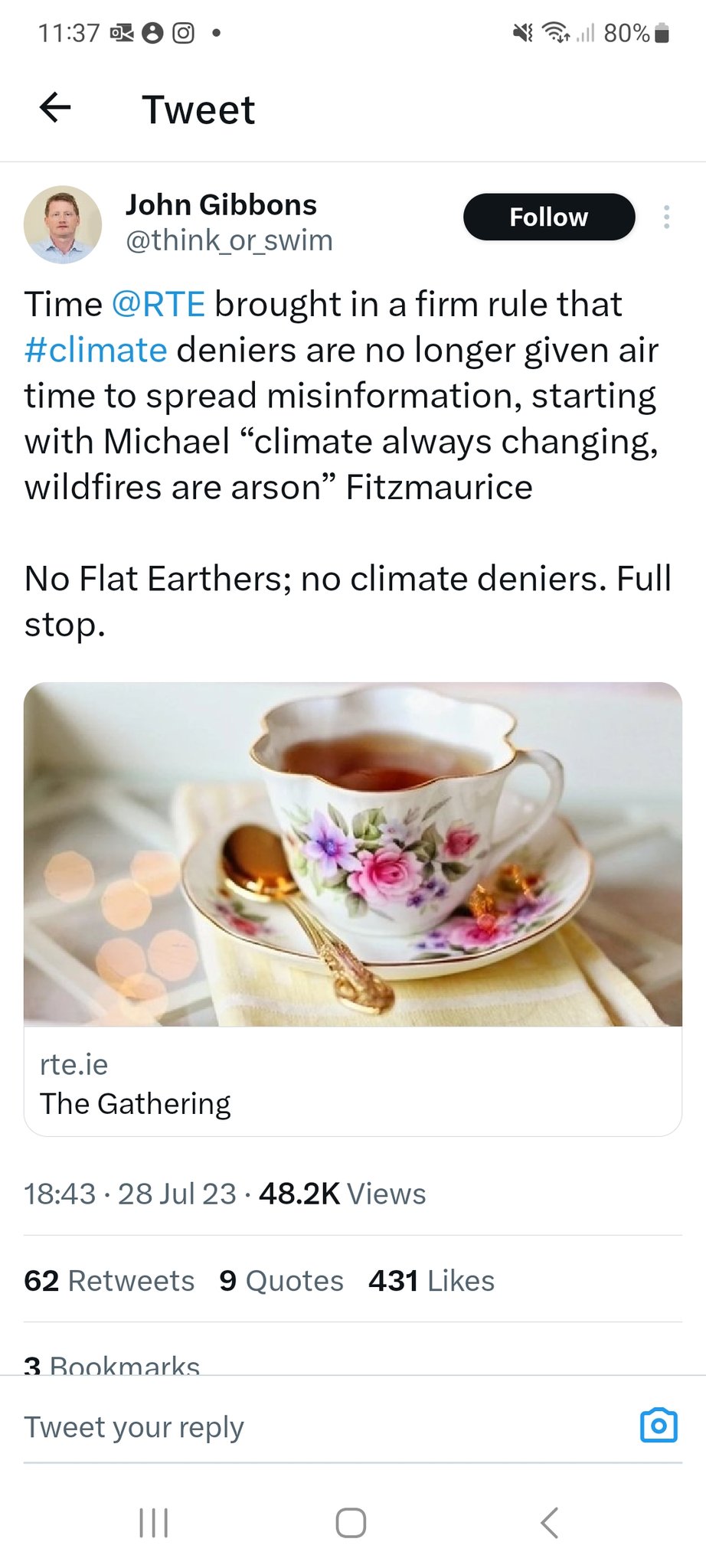This weekend, well known climate change campaigner John Gibbons issued another one of his semi-regular cri du ceours about the Irish media and its abominable alleged tolerance for people who do not agree with him on Climate Change. Channelling Senator Palpatine’s heartfelt command to the Gungans in “Star Wars: The Phantom Menace”, Gibbons came very close to repeating it verbatim: Wipe them out. All of them.

He was not alone. Writing in the Irish Times, Archbishop O’Toole did not spare the rod for those who, he declares, cannot believe the evidence of their own eyes:
This is happening because of a catastrophic failure of the collective imagination. We were told very clearly decades ago about the consequences of failure to reduce carbon emissions while we had the chance to do so. We could not collectively believe in those consequences until we saw them with our own eyes – the fires, the floods, the droughts, the storms.
But now there is an even more damning question: do we even believe in what we are actually experiencing? Is seeing disbelieving? It is one thing to fail to imagine a future that scientists told us was coming. But it is quite another to be living in that future – as we most emphatically are now – and yet find it somehow incredible.
In fairness to both O’Toole, and Gibbons, it must all seem rather remarkable to them. We’ve had close to three decades of alarmism about Climate Change, all of it preached from an almost uncontested pulpit by the greatest and wisest (at least in their own estimation) minds of the age. And yet, the little folk continue to go on sun holidays. At some point it must be tempting just to throw one’s well-manicured hands to the heavens, and whisper let them burn, for they deserve it.
So why is it, then, that the climate message has so singularly failed to take root? And more to the point, what lessons can those of us on the political right learn from its failure?
The first thing to say about the Climate message is that it has, and seemingly ever will, failed to connect what it seeks with what is achievable. Most people, it is fair to say, are environmentalists on some level. Animal rights animates a huge number of people, who abhor cruelty. Basic ideas about not putting plastic in the ocean, or recycling more, get people on board. The small things that make a difference are an easy sell, when people want to make a difference, as they do.
But the high priests of the Climate have never regarded such things as anything more than piddling distractions – the Climate equivalent of getting three hail marys for your penance when what they seek, and what they demand, is ritual scourging instead. And there, their problem is that like every other religion, they’ve found it very hard to connect ritual scourging to salvation in the minds of the regular people.
Just as there are many Christians who say to themselves “if I just live a good life, God will love me, and not worry too much about the lust and the gluttony and the sloth”, there are many regular climate-curious people who feel the same: “well, I’ve had the same re-useable bag for my shopping for the past six years, so I’m doing my bit”. The basic “I’m a good person” thinking that is used by the religious as an excuse for their sin is also used to excuse people from the demands of climate zealotry.
There’s a lesson there: A political movement that demands ritualised sacrifice from the masses will almost never prevail. People can be lead – but only in a direction that they really want to go.
But the more important lesson, I think, relates to tone. And here there are important things for some voices on the Irish right to consider.
Apocalyptic language simply does not translate. There are parallels between sentences like “if we don’t act now, the world will burn by 2050”, and sentences like “if we don’t act now, Irish people will be a minority in Ireland by 2050”. In both cases, half your audience will be dead by 2050, and the other half shrug and say “we’ll cope”.
What climate campaigners are learning the hard way is that the public does not respond well, in the modern west, to outright zealotry. They’ll nod politely, like a fella listening at mass to a sermon about adultery and fornication, and still head out on the pull next Friday night. Because this is the moral standard by which we now live: So long as I’m basically a good person, I’ve done what I can.
As it happens, your correspondent happens to think that in all cases described, the average punter has a more realistic view of the world than the zealots. And that they are wise, when they hear zealotry, to nod politely and proceed to ignore it.
And that’s why, even if Gibbons gets his wish and all opposition is cleared from the airwaves, his message still won’t resonate. And it’s why Fintan will be sitting somewhere in a 35 degree summer, in 2030, bemoaning that nobody else recognises that the world is cooking.
Those of us who oppose them should continue to laugh at them. What we should not do, in our own approach to the world, is emulate them.